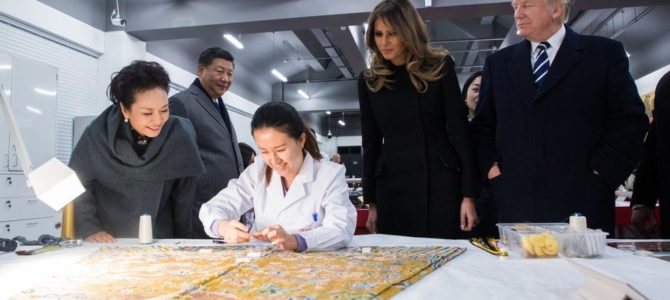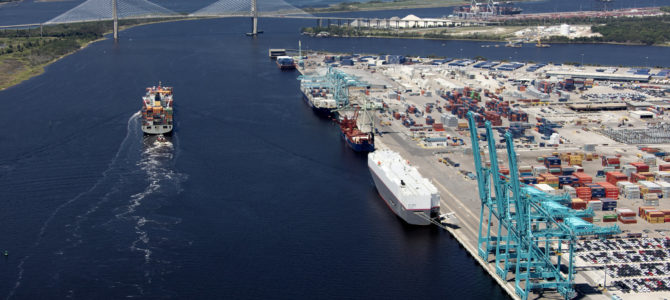
The Trump administration announced Thursday that it would impose tariffs on steel and aluminum imports from some of the United States’ neighbors and closest allies on Friday, June 1. Affected countries and regions include Canada, Mexico, and the European Union (EU).
Back in March, President Trump declared his administration intended to impose global tariffs of 25 percent on imported steel and 10 percent on aluminum, based on national security concerns. The administration is relying on an obscure law, Section 232 of the Trade Expansion Act of 1962, which authorizes the secretary of commerce to conduct comprehensive investigations to determine the effects on U.S. national security of imports of any article.
If a threat is found, the Commerce Department will recommend tariffs and quotas to curb imports. But the Trump administration delayed implementing these tariffs on some neighbors and allies to give them a chance for trade negotiations, during which Trump hoped to achieve significant concessions. But negotiations with Canada and Mexico to rewrite the North American Free Trade agreement, and negotiations with the EU, have been slow going. No one seems to take President Trump’s tough trade talk seriously.
So President Trump finally lost patience and decided to carry out his threats last week. Besides imposing steel and aluminum tariffs on June 1, it’s reported that Trump is also considering imposing tariffs on imported motor vehicles and auto parts. Is President Trump’s latest move a negotiation tactic or a miscalculation? Depends on whom you ask.
Through Tariffs, Trump Is Raising Taxes on Americans
President Trump and the trade hawks inside the administration probably regard this latest move as a negotiation tactic that may force our trading partners’ hands. But from the free market and free trade perspective, imposing tariffs on imported goods is always a bad idea because tariffs are a tax on American consumers and businesses. Supporters like to point out that tariffs can save jobs in certain industries, but often fail to point out the harm to consumers and job losses in other industries that result.
Using the auto tariff as an example, The Wall Street Journal estimates that although a 25 percent tariff on U.S. imports of automobiles and parts from all countries may create an additional 92,400 auto-related jobs in the United States, close to 300,000 jobs will be lost as the effect of the tariff ripples across the economy. Gross domestic product will decline by 0.1 percent. The estimate doesn’t take into account the retaliatory tariffs that other countries will impose on the United States, either. But we already know other countries will retaliate.
Rather than bowing to President Trump’s trade threats, the EU declared it would hit back with its own tariffs on a list of U.S. exports worth €6.4 billion ($7.5 billion), which could go into effect staring June 20. The EU also plans to take the United States to the World Trade Organization’s (WTO’s) “trade court” to get President Trump’s policy declared illegal.
Canada will place tariffs on American goods, including steel and aluminum, up to about $12.8 billion. Mexico also announced it would target several U.S. goods, including some laminated steel, pipe products, and agricultural products including fruits and cheese.
Besides negative economic effects, waging trade wars against some of the United States’s closest allies also carries several political risks: creating rifts and distrust between the United States and allies that may harm work together in international affairs; and possibly driving our allies into the arms of U.S. adversaries such as China and Russia, which could hurt U.S. interests. Given both the negative economic effects and political risks, President Trump’s latest trade war with allies seems a miscalculated move, a fight he shouldn’t have picked.
China’s Trade Imbalance Isn’t the Real Problem
The only trade war President Trump and his administration should focus on is with China. The U.S. trade deficit with China was $375 billion in 2017, the largest in the world. The administration has been pushing China to lower the trade imbalance by $200 billion by 2020.
China never officially agreed to this demand. But in the trade truce the two countries reached two weeks ago, China agreed to buy more American agriculture products to help lower the trade imbalance. Unsatisfied with that commitment, President Trump announced this week he would place punitive tariffs on US$50 billion of Chinese imports and restrict Chinese investment in the American hi-tech industry.
Karl Rove, a former senior advisor to President George W. Bush, wrote recently that “A pledge by China to reduce its trade surplus with the U.S. is difficult to enforce and easily discarded. It distracts from the underlying problems in the U.S. trading relationship with China while giving the Chinese more time to dominate the technologies of the future.”
The real threat China presents to the U.S. economy and U.S. businesses is not a trade imbalance, but unfair trade practices such as discriminatory market access, including foreign ownership restrictions, forced technology transfers as a condition of doing business in China, and outright intellectual property theft. Then there is China’s famous “Made in China 2025” initiative, a blueprint for transforming the country into an advanced technology powerhouse.
The plan identified 10 industries such as driverless cars that China wants to become globally competitive in by 2025, and globally dominant in during this century. Chinese government heavily subsidizes businesses in these industries. The Chinese government has also made it clear that China won’t abandon the 2025 initiative as a trade concession, no matter how many threats it receives from the United States.
Competing against the world’s second-largest economy and an ideological adversary can’t be a half-hearted effort. The Trump administration needs all its manpower to address the current trade deficit, China’s unfair trade practices, and China’s future ambitions. Thus, the right approach is not to start trade wars with allies and neighbors over industries and sectors that have very small positive economic effects on the U.S. economy.
Instead, the Trump administration should solely focus on dealing with China, not on deficit alone, but on establishing fair, rule-based trade practices for the two countries. The administration also needs to recognize such effort may take a long time to bear fruits. As Rove says, “America’s trade negotiators should play the long game. The Chinese are. One lesson of American history is that U.S. workers and innovators have always been able to compete with anyone when the rules are fair. That should be the Trump administration’s principal trade goal.”









